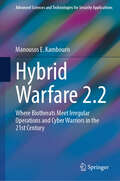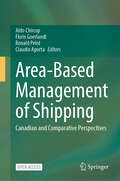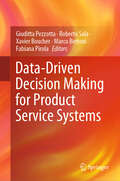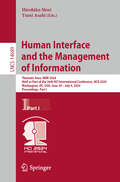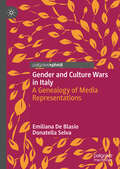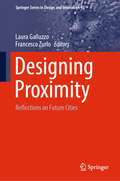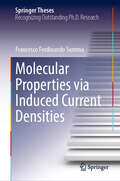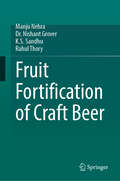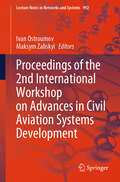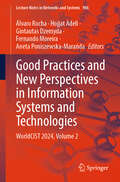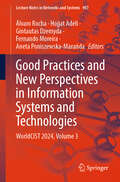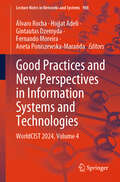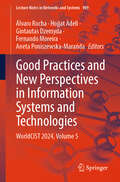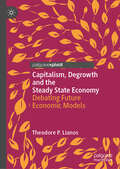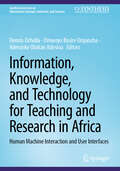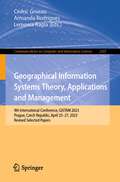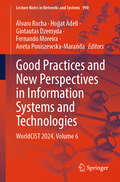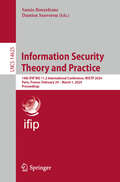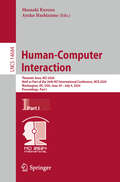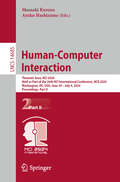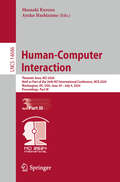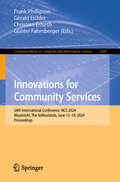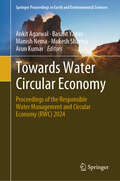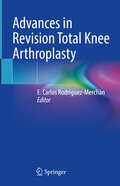- Table View
- List View
Hybrid Warfare 2.2: Where Biothreats Meet Irregular Operations and Cyber Warriors in the 21st Century (Advanced Sciences and Technologies for Security Applications)
by Manousos E. KambourisThe concept of Hybrid Warfare has gained prominence in recent decades. It is a novel terminology, but the concept is detectable since antiquity: Ancient Chinese, Ancient Greeks and the Jews of Exodus were all well familiar, so well to have let us know. Similarly, bioagents have been used malevolently since always. What is novel is that these two, in the present context, are not only interfacing smoothly, but in an enhanced context: The Hybrid Warfare, which has now enriched its portfolio, from actions of provocation, insurgency, economic warfare, special operations, proxy warfare and social destabilization to the Residual domain, the cyberspace, while the conventional, 3D space expands. Now the Space and the Deep are included in the topography of the friction zone. In this, the bio- factor becomes not only relevant but also an amplifier: using the technology malevolently, all the advances made to combat disease may be used to cause, further, or perplex and complicate disease. Improved or totally novel or even alien germs may replace explosives in bombs, shells or suicidal /kamimaze drones and taint bullets and fragments. Microrobots may deliver cancer cells to targeted individuals to foster cancer, or specific supergerms for an infection to rage unchallenged. And what happens if the mechanism of these cancers and infections is intentionally provided with an Abort signal? Global extortions would become probable, not just possible. Far from Science Fiction, this dystopia becomes more probable by the day. The Artificial Intelligence simply makes it easier to occur. Technology allows manipulation and intervention in levels and extends only imagined in the Past, but the application of these capabilities is clearly of dual use, with the destructive potential leveraged by the complexity of the social and state structure. Within this book, we explore the “How” (occasionally the “What” also) in some of these instances. From cyber terrorists to aggressive bioindustrialists and “democratized” ballistic and cruise missile technology, it could be coined as "The Book of Modern Mayhem”.
Area-Based Management of Shipping: Canadian and Comparative Perspectives
by Claudio Aporta Aldo Chircop Floris Goerlandt Ronald PelotThis open access book fills a gap in the literature on shipping in a number of cross-cutting fields (including marine transportation law and policy, law of the sea, Indigenous rights, marine environmental management, and risk and safety studies). Moreover, the book includes a focus on the consideration of Indigenous rights in shipping, a topic of emerging importance. There are, to our knowledge, no directly competing titles with the same interdisciplinary approach to conceptualize, understand, and describe best practices for area-based management approaches. There are, however, related titles which cover some aspects of area-based management, usually from narrow disciplinary perspectives. Area-based management in the governance of shipping has become a useful and effective approach to promote maritime safety, maritime security, and pollution prevention and to mitigate the adverse impacts of shipping on the marine environment and coastal communities. Based on the results of a research project and a major workshop convened at Dalhousie University in Canada, this book consists of multidisciplinary studies and analyses of major issues pertaining to area-based management in shipping from a comparative perspective, but with the principal focus on Canada. The book contains both theoretical and empirical contributions.
Data-Driven Decision Making for Product Service Systems
by Xavier Boucher Giuditta Pezzotta Roberto Sala Marco Bertoni Fabiana PirolaThis book is a compilation of theoretical and practical contributions aimed at facilitating the servitization of manufacturing companies, specifically focusing on data-driven decision-making within the context of Product-Service Systems (PSS). Providing a comprehensive overview, it discusses the latest breakthroughs in operational, tactical, and strategic decision-making for PSS, leveraging data-driven processes, methodologies, and tools. Therefore, the book significantly contributes to strengthening the knowledge on the use of data-driven decision-making methods and tools all the phases of the PSS lifecycle.From extended warranties and leasing to pay-per-use and other innovative configurations, manufacturing companies are increasingly adopting servitized business models and PSS to create additional value for their customers and users and create robust relationships with them, ensuring more reliable cash flows. In this setting, effective information management and the utilization of aggregated operational data have become essential for guiding strategic, tactical, and operational decisions.This book not only consolidates theoretical frameworks but also offers practical insights into data-driven decision-making in PSS, providing deep knowledge on how complex decisions can be taken along the various phases of the PSS lifecycle using data-driven methods and tools. Key areas of focus include: 1. In the Beginning of Life, introducing new services tailored to customer needs, disclosing new business opportunities in terms of revenues, and extending the PSS Middle of Life.2. Designing or re-designing assets and/or services, thereby influencing the PSS Beginning of Life.3. Enhancing daily decisions related to asset management to improve the PSS Middle of Life.4. Optimizing daily decisions related to service delivery and management, aimed at enhancing the PSS Middle of Life.5. Facilitating informed decisions on recycling, remanufacturing, refurbishing, and revamping, impacting the PSS End of Life.This book will be of interest to researchers and managers in industry as it offers insights that bridge the gap between theory and practical application in the evolving landscape of PSS.
Human Interface and the Management of Information: Thematic Area, HIMI 2024, Held as Part of the 26th HCI International Conference, HCII 2024, Washington, DC, USA, June 29–July 4, 2024, Proceedings, Part I (Lecture Notes in Computer Science #14689)
by Hirohiko Mori Yumi AsahiThis three-volume set LNCS 14789-14791 constitutes the thoroughly refereed proceedings of the thematic area Human Interface and the Management of Information, HIMI 2024, held as part of the 26th International Conference on Human-Computer Interaction, HCI International 2024 (HCII 2024), was held as a hybrid event in Washington DC, USA, during June/July 2024. The total of 1271 papers and 309 posters included in the HCII 2023 proceedings was carefully reviewed and selected from 5108 submissions. The HIMI conference addressed approaches and objectives of information and data design, retrieval, presentation and visualization, management, and evaluation in human computer interaction in a variety of application domains, such as, for example, learning, work, decision, collaboration, medical support, and service engineering, and much more.
Gender and Culture Wars in Italy: A Genealogy of Media Representations
by Donatella Selva Emiliana De BlasioThis book examines contemporary culture wars around gender in Italy. Applying methods from European cultural studies, the authors reconstruct the ways in which gender issues have become part of the contemporary culture wars in Italy. Recently the convergence between neoliberalism and populism has emphasised the centrality of gender in the political arena at the global level, as well as its crucial place in the rise of far-right and alt-right formations. By examining the cases of three key debates from the last five years, this book traces the moments, actors, and argumentative strategies that triggered these culture wars around gender issues.
Designing Proximity: Reflections on Future Cities (Springer Series in Design and Innovation #45)
by Francesco Zurlo Laura GalluzzoThis book showcases nine possible scenarios for future cities, based on different aspects and characteristics of the term "proximity". Different points of view have been investigated on many themes related to the city of proximities: from bottom-up design actions to the inclusive city, from neighborhood services to public space in transformation, to platforms and economies of proximity. When discussing the concept of proximity, it is imperative to several aspects of building and inhabiting the city of fifteen minutes. The city and its neighborhoods are complex structures, made up of stratified levels of evolving systems, that encompass administrative and political aspects, urban spatial considerations, the dynamics of human interaction, and more. The necessity to re-appropriate the urban space leads all inhabitants to contemplate different aspects of their lives concerning proximity space, reflecting on how behavior, actions, and relationships can be improved and transformed to make our future more sustainable. This book envisions future scenarios that will make public space an active and functional place for the city, more inclusive, responding to the needs and desires of the different populations that inhabit it.
Molecular Properties via Induced Current Densities (Springer Theses)
by Francesco Ferdinando SummaThis book outlines past and new developments in molecular response theory in terms of static and dynamic-induced current densities and showcases an important step forward in the field of molecular density functions and their topological analysis. The book begins with a general perspective on topics such as classical Hamiltonian, quantum mechanical Hamiltonian, and topological analysis of the electron charge density, followed by an in-depth overview of time-dependent and -independent perturbations, and applications. In this book, the author presents a completely new approach that allows the interpretation of electric and magnetic properties through origin-independent density functions. Readers will also find examples of how the new origin-independent density functions are useful for rationalizing the chemical behavior of molecules interacting with impinging radiation. The concepts contained within the book are the basis for a deeper understanding of Nuclear magnetic resonance (NMR) and Electron paramagnetic resonance (EPR) spectroscopies, as well as the mechanisms that give rise to electric polarization and optical activity in chiral systems. A basic knowledge of quantum mechanics and ab initio electronic structure calculation methods such as Hartree-Fock and Density Functional Theory is required. Given its breadth, the book provides an important contribution to the field of Quantum Chemical Topology and appeals to students and researchers interested in learning more about the relationship between electrical and magnetic properties, density functions derivable from them and experimental observables.
Fruit Fortification of Craft Beer
by Manju Nehra Nishant Grover K.S. Sandhu Rahul ThoryBeer has been one of the staples in alcohol consumption since the earliest civilizations. In the present day, beer is more popular than ever and shows no signs of decreasing in production volume and revenue generation. Some of the most popular craft beer types utilize fruit raw materials in their production, including wheat beers, porters, high gravity beers, stouts and Lambics. There have been multiple sources published over the decades focusing on beer brewing and brewing science, many of which do cover fruit fortifications and craft beer production. Due to the increasing popularity of fruit-fortified craft beers, an updated singular source is needed focusing on the use of fruit raw materials in the brewing process for various types of craft beer. Fruit Fortification of Craft Beer extensively outlines the use of fruits in the brewing and malting processes for all types of popular craft beers, outlining the latest technological and processing advances. Various fruit material additives are covered as are their specific uses in the brewing process, their characteristics and processing methods. The main types of craft beers which utilize fruit additives are covered including their chemical profiles and nutritional aspects. A major aspect of this book is the linking of the past and the future, examining how fruit has been used in beer fortification since ancient times and how the technologies and processing methods have advanced with the increasing popularity of locally-brewed craft beers. In focusing on these advances, this work brings fruit fortification in craft beers up to the present, providing an in-depth source for researchers and brewers.
Proceedings of the 2nd International Workshop on Advances in Civil Aviation Systems Development (Lecture Notes in Networks and Systems #992)
by Ivan Ostroumov Maksym ZaliskyiThis book includes high-quality research papers presented at 2nd International Workshop on Advances in Civil Aviation Systems Development (ACASD 2024), which was at National Aviation University, Kyiv Ukraine, on March 26, 2024. This book presents original results of a scholarly study of unique research teams and market leaders on the development in civil aviation systems and its application. The book topics include major research areas focused on advances in air traffic management, data processing in civil aviation, automatic control in civil aviation systems, modern trends in navigation systems development, methods of operational efficiency improvement, human factor, and application of artificial intelligence in civil aviation systems. This book is useful for scholars and professionals in the civil aviation domain.
Good Practices and New Perspectives in Information Systems and Technologies: WorldCIST 2024, Volume 2 (Lecture Notes in Networks and Systems #986)
by Hojjat Adeli Álvaro Rocha Gintautas Dzemyda Aneta Poniszewska-Marańda Fernando MoreiraThis book is composed by a selection of articles from the 12th World Conference on Information Systems and Technologies (WorldCIST'24), held between 26 and 28 of March 2024, at Lodz University of Technology, Lodz, Poland. WorldCIST is a global forum for researchers and practitioners to present and discuss recent results and innovations, current trends, professional experiences and challenges of modern Information Systems and Technologies research, together with their technological development and applications. The main and distinctive topics covered are: A) Information and Knowledge Management; B) Organizational Models and Information Systems; C) Software and Systems Modeling; D) Software Systems, Architectures, Applications and Tools; E) Multimedia Systems and Applications; F) Computer Networks, Mobility and Pervasive Systems; G) Intelligent and Decision Support Systems; H) Big Data Analytics and Applications; I) Human-Computer Interaction; J) Ethics, Computers and Security; K) Health Informatics; L) Information Technologies in Education; M) Information Technologies in Radiocommunications; and N) Technologies for Biomedical Applications. The primary market of this book are postgraduates and researchers in Information Systems and Technologies field. The secondary market are undergraduates and professionals as well in Information Systems and Technologies field.
Good Practices and New Perspectives in Information Systems and Technologies: WorldCIST 2024, Volume 3 (Lecture Notes in Networks and Systems #987)
by Hojjat Adeli Álvaro Rocha Gintautas Dzemyda Aneta Poniszewska-Marańda Fernando MoreiraThis book is composed by a selection of articles from the 12th World Conference on Information Systems and Technologies (WorldCIST'24), held between 26 and 28 of March 2024, at Lodz University of Technology, Lodz, Poland. WorldCIST is a global forum for researchers and practitioners to present and discuss recent results and innovations, current trends, professional experiences and challenges of modern Information Systems and Technologies research, together with their technological development and applications. The main and distinctive topics covered are: A) Information and Knowledge Management; B) Organizational Models and Information Systems; C) Software and Systems Modeling; D) Software Systems, Architectures, Applications and Tools; E) Multimedia Systems and Applications; F) Computer Networks, Mobility and Pervasive Systems; G) Intelligent and Decision Support Systems; H) Big Data Analytics and Applications; I) Human-Computer Interaction; J) Ethics, Computers and Security; K) Health Informatics; L) Information Technologies in Education; M) Information Technologies in Radiocommunications; and N) Technologies for Biomedical Applications. The primary market of this book are postgraduates and researchers in Information Systems and Technologies field. The secondary market are undergraduates and professionals as well in Information Systems and Technologies field.
Good Practices and New Perspectives in Information Systems and Technologies: WorldCIST 2024, Volume 4 (Lecture Notes in Networks and Systems #988)
by Hojjat Adeli Álvaro Rocha Gintautas Dzemyda Aneta Poniszewska-Marańda Fernando MoreiraThis book is composed by a selection of articles from the 12th World Conference on Information Systems and Technologies (WorldCIST'24), held between 26 and 28 of March 2024, at Lodz University of Technology, Lodz, Poland. WorldCIST is a global forum for researchers and practitioners to present and discuss recent results and innovations, current trends, professional experiences and challenges of modern Information Systems and Technologies research, together with their technological development and applications. The main and distinctive topics covered are: A) Information and Knowledge Management; B) Organizational Models and Information Systems; C) Software and Systems Modeling; D) Software Systems, Architectures, Applications and Tools; E) Multimedia Systems and Applications; F) Computer Networks, Mobility and Pervasive Systems; G) Intelligent and Decision Support Systems; H) Big Data Analytics and Applications; I) Human-Computer Interaction; J) Ethics, Computers and Security; K) Health Informatics; L) Information Technologies in Education; M) Information Technologies in Radiocommunications; and N) Technologies for Biomedical Applications. The primary market of this book are postgraduates and researchers in Information Systems and Technologies field. The secondary market are undergraduates and professionals as well in Information Systems and Technologies field.
Good Practices and New Perspectives in Information Systems and Technologies: WorldCIST 2024, Volume 5 (Lecture Notes in Networks and Systems #989)
by Hojjat Adeli Álvaro Rocha Gintautas Dzemyda Aneta Poniszewska-Marańda Fernando MoreiraThis book is composed by a selection of articles from the 12th World Conference on Information Systems and Technologies (WorldCIST'24), held between 26 and 28 of March 2024, at Lodz University of Technology, Lodz, Poland. WorldCIST is a global forum for researchers and practitioners to present and discuss recent results and innovations, current trends, professional experiences and challenges of modern Information Systems and Technologies research, together with their technological development and applications. The main and distinctive topics covered are: A) Information and Knowledge Management; B) Organizational Models and Information Systems; C) Software and Systems Modeling; D) Software Systems, Architectures, Applications and Tools; E) Multimedia Systems and Applications; F) Computer Networks, Mobility and Pervasive Systems; G) Intelligent and Decision Support Systems; H) Big Data Analytics and Applications; I) Human-Computer Interaction; J) Ethics, Computers and Security; K) Health Informatics; L) Information Technologies in Education; M) Information Technologies in Radiocommunications; and N) Technologies for Biomedical Applications. The primary market of this book are postgraduates and researchers in Information Systems and Technologies field. The secondary market are undergraduates and professionals as well in Information Systems and Technologies field.
Capitalism, Degrowth and the Steady State Economy: Debating Future Economic Models (Palgrave Insights into Apocalypse Economics)
by Theodore P. LianosThis book examines the contemporary state of the capitalist economyand its future trajectory in a world characterized by multiple crises from population growth to ecological damage. Setting an understanding of modern capitalism in global historical context, chapters consider the uncertainty of capitalism’s future and argues that capitalism must adapt dramatically to survive.. The book examines the major problems that a capitalist system faces, including inequality, organized crime, uncontrolled technological development, polarizing geopolitics, food security and climate change. To address these multifaceted challenges andminimize the impact of capitalism in exacerbating them, the book discusses the potential viability of a ‘steady state’ economic model and a de-growth approach to the global economy. It also considers various alternative models for the future, including eco-socialism and participatory socialism. This book deftly weaves together perspectives on a wide variety of issues and will be a useful resource for scholars interested in Marxist economics and heterodox economics, political economy, economic development and economic thought.
Information, Knowledge, and Technology for Teaching and Research in Africa: Human Machine Interaction and User Interfaces (Synthesis Lectures on Information Concepts, Retrieval, and Services)
by Dennis Ocholla Omwoyo Bosire Onyancha Aderonke Olaitan AdesinaThis book focuses on human machine interaction and user interfaces for teaching and research in Africa. The importance of digital humanities (DH) is recognized by focusing on the theoretical and historical development of DH in the context of LIS education and how infrastructure influences DH programs/initiatives in respective LIS schools. These findings and recommendations provide valuable knowledge for developing the domain and establishing potential areas of collaboration in DH research and curriculum. The book explores and explicates what the Diffusion of Innovations theory is about as well as the characteristics of innovators. The Diffusion of Innovations theory is relevant to the LIS field, which has widely adopted numerous innovations to automate a wide range of administrative and technical processes, build databases and networks, and provide better services to library users. The diffusion and adoption of technology have become imperative for the efficient management ofmodern libraries and LIS as a field in general. Existing literature that is related to the adoption, use, and challenges facing the development of clinical informatics in teaching hospitals in developing countries is reviewed. It is also revealed that hospitals in developing countries should embrace the use of tools for effective healthcare delivery and that nursing informatics is very significant in nursing practice. In addition, the role of academic institutions and the use of information and communication technologies (ICTs) by librarians for information and knowledge (IKM) in such institutions in the Fourth Industrial Revolution (4IR) is addressed. The book acknowledges the marginalization of indigenous knowledge and that there is a need for Africa to develop and accelerate strategies for enhancing indigenous knowledge for future generation and ICT is poised to play a crucial role.
Geographical Information Systems Theory, Applications and Management: 9th International Conference, GISTAM 2023, Prague, Czech Republic, April 25–27, 2023, Revised Selected Papers (Communications in Computer and Information Science #2107)
by Cédric Grueau Armanda Rodrigues Lemonia RagiaThis book constitutes the refereed post-proceedings of the 9th International Conference on Geographical Information Systems Theory, Applications and Management, GISTAM 2023, held in Prague, Czech Republic during April 25–27, 2023. The 6 full papers included in this book were carefully reviewed and selected from 37 submissions. They focus on challenges in geo-spatial data sensing, observation, representation, processing, visualization, sharing and managing, in all aspects concerning both information communication and technologies (ICT) as well as management information systems and knowledge-based systems.
The Essentials of Thermodynamics (Physical Chemistry in Action)
by Miloslav PekařThis monograph offers a unique approach to understanding thermodynamics by blending practical experience, a mathematically rigorous foundation, and historical insights. It presents the evolution of thermodynamics, demonstrating that the functions, equations, relationships, and quantities didn't simply materialize but were rooted in the human experience of heat and cold. While equilibrium thermodynamics is the primary focus, time is integrated as a fundamental element, distinguishing this from traditional treatments. Readers will find familiar heat-related experiences transformed into model equations, revealing the natural emergence of fundamental thermodynamic concepts. These essentials are then distilled into simple axioms summarizing the core principles of equilibrium thermodynamics. The book goes beyond macroscopic descriptions, delving into microscopic connections at the atomic and molecular levels. It is suitable for a diverse readership, including students in science and technology, professionals looking to refresh their knowledge of thermodynamics, and those interested in exploring advanced, non-equilibrium thermodynamics. While it caters to a broad audience, it is particularly beneficial for individuals in chemistry and chemical engineering, requiring only a basic understanding of calculus.
Good Practices and New Perspectives in Information Systems and Technologies: WorldCIST 2024, Volume 6 (Lecture Notes in Networks and Systems #990)
by Hojjat Adeli Álvaro Rocha Gintautas Dzemyda Aneta Poniszewska-Marańda Fernando MoreiraThis book is composed by a selection of articles from the 12th World Conference on Information Systems and Technologies (WorldCIST'24), held between 26 and 28 of March 2024, at Lodz University of Technology, Lodz, Poland. WorldCIST is a global forum for researchers and practitioners to present and discuss recent results and innovations, current trends, professional experiences and challenges of modern Information Systems and Technologies research, together with their technological development and applications. The main and distinctive topics covered are: A) Information and Knowledge Management; B) Organizational Models and Information Systems; C) Software and Systems Modeling; D) Software Systems, Architectures, Applications and Tools; E) Multimedia Systems and Applications; F) Computer Networks, Mobility and Pervasive Systems; G) Intelligent and Decision Support Systems; H) Big Data Analytics and Applications; I) Human-Computer Interaction; J) Ethics, Computers and Security; K) Health Informatics; L) Information Technologies in Education; M) Information Technologies in Radiocommunications; and N) Technologies for Biomedical Applications. The primary market of this book are postgraduates and researchers in Information Systems and Technologies field. The secondary market are undergraduates and professionals as well in Information Systems and Technologies field.
Information Security Theory and Practice: 14th IFIP WG 11.2 International Conference, WISTP 2024, Paris, France, February 29 – March 1, 2024, Proceedings (Lecture Notes in Computer Science #14625)
by Samia Bouzefrane Damien SauveronThis volume constitutes the refereed proceedings of the 14th IFIP WG 11.2 International Conference on Information Security Theory and Practices, WISTP 2024, held in Paris, France. The 12 full papers presented were carefully reviewed and selected from 30 submissions. The papers presented in this proceedings focus on emerging trends in security and privacy, including experimental studies of fielded systems while exploring the application of security technology, and highlighting successful system implementations.
Human-Computer Interaction: Thematic Area, HCI 2024, Held as Part of the 26th HCI International Conference, HCII 2024, Washington, DC, USA, June 29 – July 4, 2024, Proceedings, Part I (Lecture Notes in Computer Science #14684)
by Masaaki Kurosu Ayako HashizumeThis five-volume set LNCS 14684-14688 constitutes the refereed proceedings of the Human Computer Interaction thematic area of the 26 International Conference on Human-Computer Interaction, HCII 2024, held in Washington, DC, USA, during June 29 – July 4, 2024. The total of 1271 papers and 309 posters included in the HCII 2024 proceedings was carefully reviewed and selected from 5108 submissions. The VAMR 2024 proceedings were organized in the following topical sections: Part I: HCI Theory and Design and Evaluation Methods and Tools; Emotions in HCI. Part II: Human-Robot Interaction; Child-Computer Interaction. Part III: HCI for Mental Health and Psychological Wellbeing; HCI in Healthcare. Part IV: HCI, Environment and Sustainability; Design and User Experience Evaluation Case Studies. Part V: Multimodality and Natural User Interfaces; HCI, AI, Creativity, Art and Culture.
Human-Computer Interaction: Thematic Area, HCI 2024, Held as Part of the 26th HCI International Conference, HCII 2024, Washington, DC, USA, June 29 – July 4, 2024, Proceedings, Part II (Lecture Notes in Computer Science #14685)
by Masaaki Kurosu Ayako HashizumeThis five-volume set LNCS 14684-14688 constitutes the refereed proceedings of the Human Computer Interaction thematic area of the 26 International Conference on Human-Computer Interaction, HCII 2024, held in Washington, DC, USA, during June 29 – July 4, 2024. The total of 1271 papers and 309 posters included in the HCII 2024 proceedings was carefully reviewed and selected from 5108 submissions. The VAMR 2024 proceedings were organized in the following topical sections: Part I: HCI Theory and Design and Evaluation Methods and Tools; Emotions in HCI. Part II: Human-Robot Interaction; Child-Computer Interaction. Part III: HCI for Mental Health and Psychological Wellbeing; HCI in Healthcare. Part IV: HCI, Environment and Sustainability; Design and User Experience Evaluation Case Studies. Part V: Multimodality and Natural User Interfaces; HCI, AI, Creativity, Art and Culture.
Human-Computer Interaction: Thematic Area, HCI 2024, Held as Part of the 26th HCI International Conference, HCII 2024, Washington, DC, USA, June 29 – July 4, 2024, Proceedings, Part III (Lecture Notes in Computer Science #14686)
by Masaaki Kurosu Ayako HashizumeThis five-volume set LNCS 14684-14688 constitutes the refereed proceedings of the Human Computer Interaction thematic area of the 26 International Conference on Human-Computer Interaction, HCII 2024, held in Washington, DC, USA, during June 29 – July 4, 2024. The total of 1271 papers and 309 posters included in the HCII 2024 proceedings was carefully reviewed and selected from 5108 submissions. The VAMR 2024 proceedings were organized in the following topical sections: Part I: HCI Theory and Design and Evaluation Methods and Tools; Emotions in HCI. Part II: Human-Robot Interaction; Child-Computer Interaction. Part III: HCI for Mental Health and Psychological Wellbeing; HCI in Healthcare. Part IV: HCI, Environment and Sustainability; Design and User Experience Evaluation Case Studies. Part V: Multimodality and Natural User Interfaces; HCI, AI, Creativity, Art and Culture.
Innovations for Community Services: 24th International Conference, I4CS 2024, Maastricht, The Netherlands, June 12–14, 2024, Proceedings (Communications in Computer and Information Science #2109)
by Günter Fahrnberger Gerald Eichler Christian Erfurth Frank PhillipsonThis book constitutes the refereed proceedings of the 24th International Conference on Innovations for Community Services, I4CS 2024, held in Maastricht, The Netherlands, during June 12–14, 2024. The 17 full papers and 5 short papers presented in this book were carefully reviewed and selected from 44 submissions. They cover a variety of topics, including Quantum Computing, Pervasive Computing, Information Analysis, Graphs and Routing, Secure Applications, Information Security in Supply Chains, Blockchain and Digital Sovereignty.
Towards Water Circular Economy: Proceedings of the Responsible Water Management and Circular Economy (RWC) 2024 (Springer Proceedings in Earth and Environmental Sciences)
by Mukesh Sharma Arun Kumar Basant Yadav Ankit Agarwal Manish NemaResponsible water management and circular economy aims to establish a common understanding of circular economy principles and resilience in the water sector and to support countries in the implementing those principles. It is essential for water security to deal with the effect of climate change. It can be achieved through smart water management, use of non-conventional water resources, rejuvenation of natural water systems, using advance tools and techniques and adaptation strategies. It will help in improving the water availability in terms of quantity as well as quality and human health. Smart water governance and educating society can also play an important role in achieveing the Sustainable Development Goal (SDG 6) “Water for all“. The book aims to accelerate interaction among various stakeholders.
Advances in Revision Total Knee Arthroplasty
by E. Carlos Rodríguez-MerchánThis book offers a comprehensive guide to revision total knee arthroplasty, a complex surgical procedure with increasing numbers due to the aging world's population. Covering both septic and aseptic prosthetic failure, it presents an updated overview of available surgical techniques – from one or two-stage revision for periprosthetic joint infection to robot-assisted total joint arthroplasty. Moreover, the authors explore the current role and future potentialities of artificial intelligence. This volume offers the reader state-of-the-art information aiming to illuminate contentious topics in the field.
